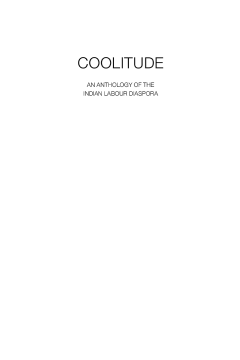
Additional Information
Book Details
Abstract
Coolitude is both an intellectual interpretation of and a poetic and artistic immersion into the world of the vanished coolie. This collection of previously unpublished texts, poems and sketches captures the essence of the Indian plantation experience and deconstructs traditional depictions of the status of the coolie in the British Empire.
'The concept of 'Coolitude' parallels that of 'Negritude', pioneered by Clive James and other African and Carribean intellectuals in the 1950s and 1960s, and could have an equally profound cultural impact...this book is both politically and intellectually ambitious. Marina Carter is one of the most highly regarded historians of the Indian Ocean. Her co-author is a poet and intellectual, a veritable giant in France...the list of his achievements goes one and on.' —Crispin Bates, University of Edinburgh
Marina Carter has worked and studied for many years in Mauritius, where she founded a pioneering NGO called the Centre for Research on Indian Ocean Societies (CRIOS). She was recently appointed as Honorary Research Fellow at the Centre for South Asian Studies, University of Edinburgh.
Khal Torabully completed his PhD in Lyon in 1976. His interest in mosaic identity brought forward an innovative book, 'Cale d'étoiles-coolitude', the founding text of the coolie migration viewed from the sea voyage, as space of identity construction/deconstruction in the post-modernist sense.
Coolitude is both an intellectual interpretation of and a poetic and artistic immersion into the world of the vanished coolie. This collection of previously unpublished texts, poems and sketches captures the essence of the Indian plantation experience and deconstructs traditional depictions of the status of the coolie in the British Empire.
The concept of 'coolitude' encompasses the experiences of first generation workers together with those of their descendants spread across the Caribbean, Pacific and Indian Ocean islands today. The symbolic value of the word lies in both the scope it gives us to interpret the specificities of the coolie experience and its use as a comparative tool. The book embraces 'coolitude' in its various incarnations: the shared experience of the voyaging migrants, the walk from village to port town and the weeks spent on board ship. All Coolies, irrespective of whether they went to Fiji, South Africa, the West Indies or the Indian Ocean islands, underwent an exile from their Indian homeland. 'Coolitude' emphasizes their shared history.
